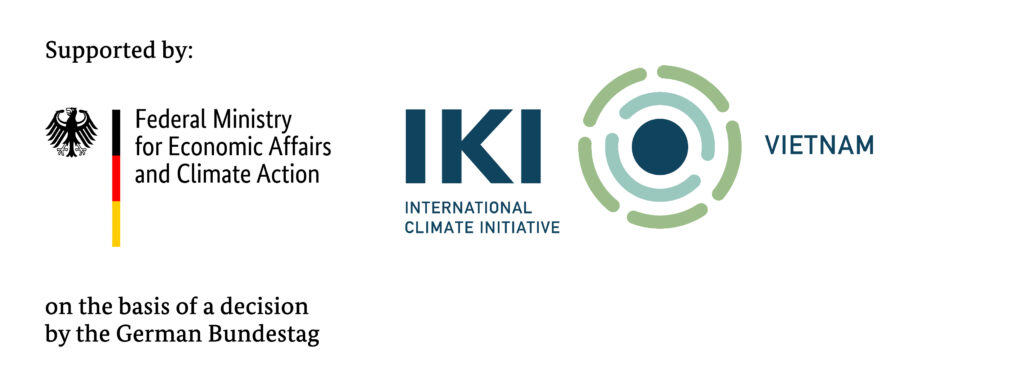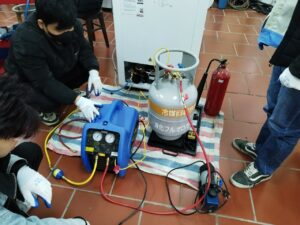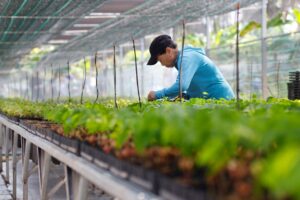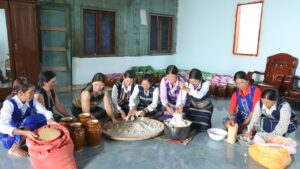Developed within the context of DeRISK SE Asia project, Agro-Climatic Bulletins (ACBs) provide localized climate– and weather-based recommendations, supporting farmers’ planning and crop management. Their demonstrated effectiveness in enhancing farmers’ climate adaptation and resilience has led to the recent decision by the Ministry of Agricultural and Rural Development (MARD) to scale ACBs to all 13 provinces in the Mekong River Delta (MRD) of Vietnam. MARD also recognized the process of ACB development and dissemination as a new Technical Advance[1]. This level of government buy-in is an important milestone for the effective scaling and sustained implementation of ACBs in the region.
[1] A Technical advance refers to a product/ an improvement or an innovation resulted from performing scientific and technological tasks, technical solutions, management solutions and application solutions in agriculture (Circular 13/2015/TT-BNNPTNT, issued by MARD in 2015). It involves the application of new knowledge, innovative ideas, or modifications to existing methods, resulting in progress and better outcomes compared to previous approaches. Once approved by the Ministry of Agriculture and Rural Development, the technical advance is officially recognized, acknowledged, and implemented by related governmental agencies.
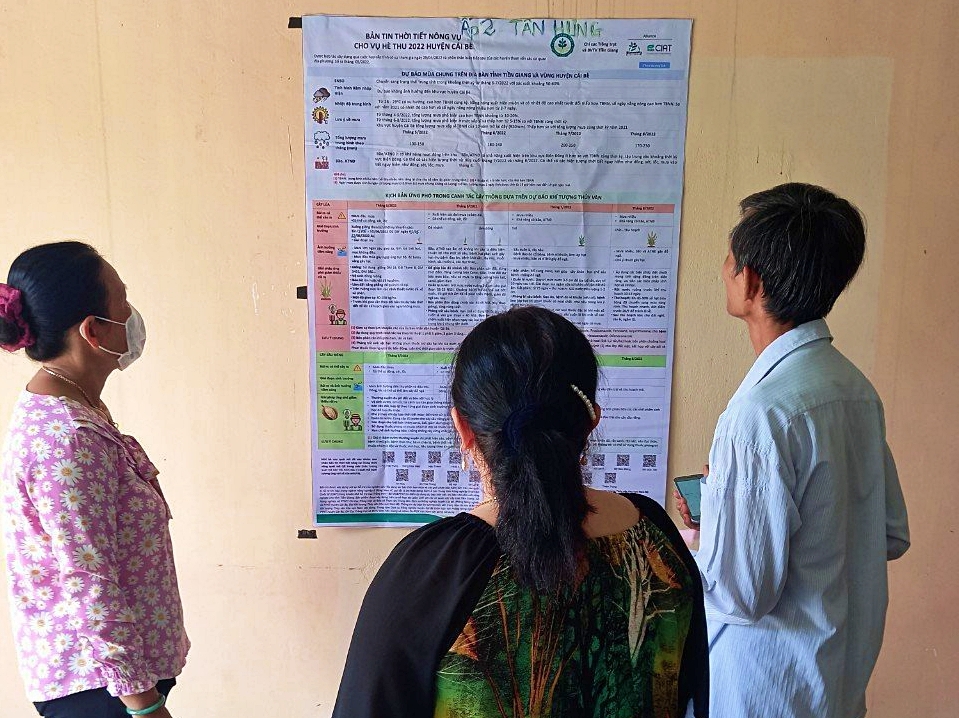
Empowering farmers with climate forecasts and tailored advisories
Agricultural communities in the MRD face various challenges due to climate change. To mitigate its impact, climate services that deliver timely weather and climate forecasts, along with location-specific recommendations, have emerged as critical. With support from DeRISK SE Asia project, the Alliance of Bioversity International and CIAT has partnered with the Department of Crop Production of MARD, to develop the ACBs based on seasonal, monthly, or 10-day forecasts since 2020.
The ACBs provide forecasts on potential risks, such as droughts, floods, or pest and disease outbreaks. They also offer advisory on seasonal planning, including decisions on crop and variety section and planting date, as well as short-term recommendations on fertilizer use, irrigation, pesticide spraying, and harvesting. These recommendations help farmers implement appropriate strategies, improve crop decisions, reduce production costs, and increase efficiency. To date, ACBs have assisted over 130,000 farmers in the region. A survey among 111 farmers using ACBs in Tien Giang province showed that 40% reported reduced pesticide costs of over 1.3 million Vietnamese dong per hectare. ACB’ adopters also had an increased average rice yield of 266 kg/ha and an average rice revenue increase of 1.83 million VND (USD 78) per hectare.
Expanding ACBs with government support
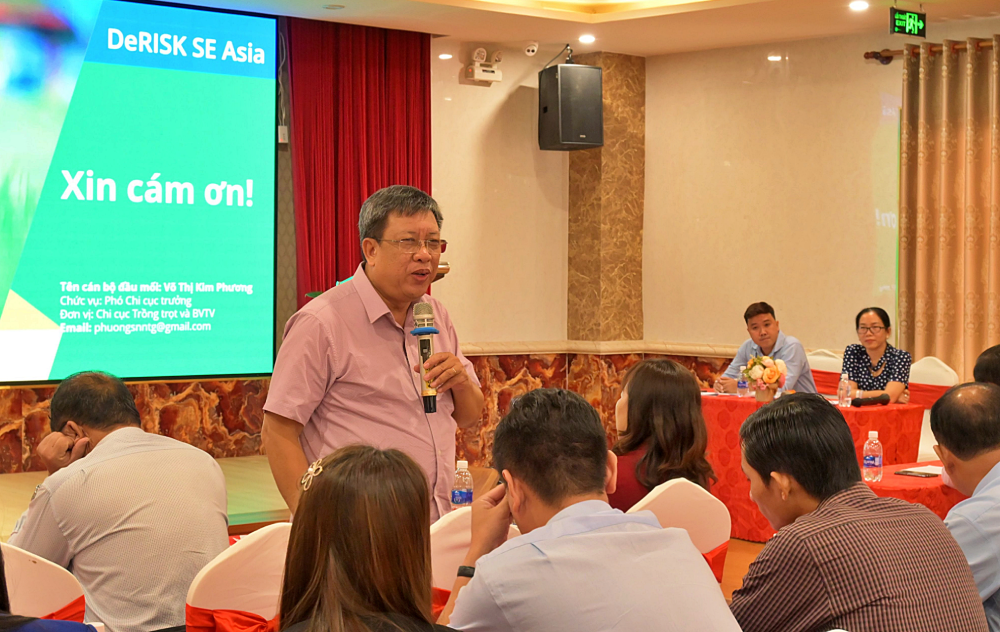
Recognizing the benefits and transformative potential of the ACBs, upon the proposal by the Department of Crop Protection (DCP), MARD has approved the plan to scale ACBs to all 13 provinces in the MRD (Decision QĐ 1033-BNN-TT dated 22 March 2023). An annual budget of 400 million Vietnamese Dong (approximately 17,000 USD) has been allocated for this through Decision QĐ 1300/QĐ-BNN-TC dated 3 April 2023. The Ministry also emphasized that scaling the ACBs will support state management of crop production and climate change risk management. This approval and investment demonstrate a strategic move towards institutionalizing ACBs as a vital component of the region’s climate change adaptation strategy to support vulnerable farmers.
ACB process Acknowledged as Technical Advance
[video_player_for_wpbakery type=”embed” video_url=”https://youtu.be/Sl3UBzRP8Bw”]
Along with the decision of scaling ACBs, the approach to co-develop and disseminate the ACBs was recognized by MARD as a Technical Advance (Decision QĐ 131 /QĐ-TT-VPPN dated 15 April 2023). This participatory process of involving various actors along the climate service value chain, including staff from hydromet centers, agricultural officers, water management staff, extension officers, and farmers themselves, has been widely appreciated for blending scientific, expert, and local knowledge.
By incorporating different perspectives and expertise, the approach effectively bridges the gaps between meteorological information and agricultural recommendations. Furthermore, it allows for the location-specific advisories, making the ACBs relevant and practical for farmers in the region.
Ms. Tran Thi My Hanh, Technical staff of DCP, highlighted the significance of this recognition, stating, “Being recognized as a Technical Advance provides governmental management agencies opportunities to apply for government funding to further scale and improve ACBs implementation.”
The way forward
Continued collaboration will be crucial to further expand and improve the ACBs. Hence, the Alliance and DCP have decided to continue working together on agro-climatic advisory within the CGIAR Initiative on Asian Mega-Deltas (AMD). Future plans are to provide capacity building and technical backstopping to new districts and provinces, support the use of the Technical Advance by local partners, and explore ways to further automate the provision of locally relevant climate information and advisory services in collaboration with the public and private sectors.
About the project: DeRISK SE Asia project is titled “Applying seasonal climate forecasting and innovative insurance solutions to climate risk management in the agriculture sector in South East Asia”. The project is led by the World Meteorological Organization (WMO) and implemented by the University of Southern Queensland (USQ) and the Alliance of Bioversity International and CIAT, with funding support from the International Climate Initiative (IKI), (https://deriskseasia.org).
